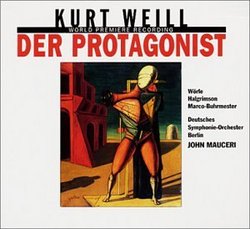| All Artists: Kurt Weill, John Mauceri, Robert Wörle, Amanda Halgrimson, Corby Welch Alexander Marco-Buhrmester Title: Weill - Der Protagonist / Wörle · Halgrimson · Marco-Burmester · Welch · Mauceri Members Wishing: 0 Total Copies: 0 Label: Capriccio Release Date: 5/1/2002 Genre: Classical Style: Opera & Classical Vocal Number of Discs: 1 SwapaCD Credits: 1 UPC: 018111926126 |
Search - Kurt Weill, John Mauceri, Robert Wörle :: Weill - Der Protagonist / Wörle · Halgrimson · Marco-Burmester · Welch · Mauceri
 | Kurt Weill, John Mauceri, Robert Wörle Weill - Der Protagonist / Wörle · Halgrimson · Marco-Burmester · Welch · Mauceri Genre: Classical
|
Larger Image |
CD Details |
CD ReviewsA Rare Glimpse of Weill the Formalist T. Helminski | Phoenix, AZ USA | 05/31/2002 (5 out of 5 stars) "Listeners familiar with Weill may recall the comic pantomime from the Deutsche Grammaphone release of the selected works. The pantomime--and the vaguely neo-classical violin concerto--indeed provide an invaluable entrée to the music of this period. Weill works within closed forms, contrives his vocal line instrumentally and means to place his listener at a level of critical detachment. Harmonically they are similar; asymetric rhytmic devices outline chords of missing thirds, chords of fourths and polychords. Even the ingratiating dance rhythms of the variation movement of the concerto are echoed faintly in the actors' choruses and the Protagonist's arias.--Or is it Wagner?
But where the concerto and the pantomime--as a kind of form independent of the larger opera--point toward the populist period of the late twenties and thirties, the opera in its entirety reveals little of the `gestic' deliberation of Der Jasager and Die Sieben Todsünden, the two pantomimes notwithstanding. That is to say Weill here exploits a different kind of gestus, one that is inextricably bound to architectural form, not melodic contour, and a kind of musical (especially harmonic) semantics akin to the `foreign-note' period of Die Dreigroschenoper. Suffice it to say that Weill still proffers `culinary' opera; Jasager and Ozeanflug are yet some ways away. That it lacks the deliberation, extra-musical pull and clarity of the later Brecht-colaborations does not make Der Protagonist a work of juvenalia, or one easily forgotten. On the contrary, already by 1924-6 Weill's work betrays his artistic maturity. Nevertheless, the opera cannot yet be understood exclusively in terms of its social function. And yet, it is not so insular as other formalist works of the period. Kaiser's libretto is no mere apologist for the creative genius, as embodied by the Protagonist, who cannot reconcile his art with his life. Rather, Kaiser challenges the vanity of the non-social artist. Weill's murderously irridescent score forms an ironic commentary on the decidedly anti-romantic text. The recording is of high quality. Mauceri is a consumate conductor; under his baton Weill's limpid orchestration finds its clearest, most poignant expression. Of course, there is something of a metallic sound to the medium, but that is unavoidable in non-historic recordings. Both soloists and instrumentalists do well to accomdate for the conditions of the studio. This edition is not valuable as a historic curiosity alone. Its theme is universal, the music perennial in its skill and poignancy. Music fans and humanists the world over shall come to enjoy this score. Enjoy." |

 Track Listings (16) - Disc #1
Track Listings (16) - Disc #1